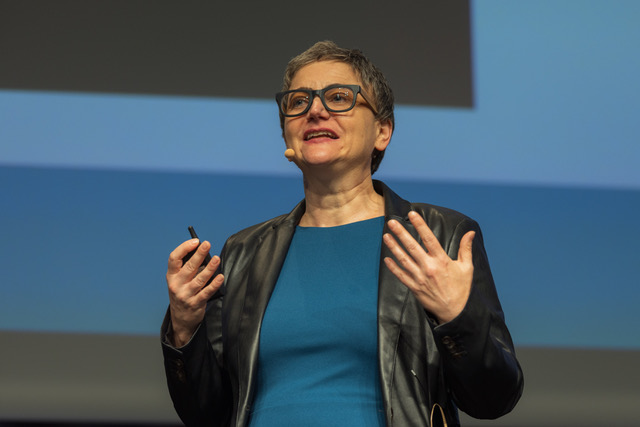August 13th, 2024
Keynote 1 - Advancing Scientific Discovery with the National Scientific Data Fabric: Democratizing Data Access and Use through Reproducibility, Analytical Tools, and User-Focused Services

Michela Taufer
Jack Dongarra Professor in High Performance Computing, The University of Tennessee Knoxville
Abstract:
In the evolving landscape of scientific research, we deal with the challenge of harnessing data from remote experimental sites and repositories. The obstacles we face are technical, logistical, and financial, calling for immediate and innovative solutions to move scientific discovery forward across the domains. Scientists’ quest for seamless data access and real-time analysis spans various applications, from guiding experiments with synchrotron light sources to leveraging the immense datasets from leading computing facilities. This imperative need goes beyond geographical boundaries and individual domains.
In this talk, we discuss the National Scientific Data Fabric (NSDF), a cutting-edge platform designed to transform data management in converging HPC-cloud environments to democratize data access for enhanced scientific discovery. NSDF integrates user-centric networking, storage, and computing, simplifying HPC and cloud complexities for data analysts and boosting scientific reproducibility and clarity. We focus on the NSDF testbed, showcasing service integration for improved data management and scientific workflow reproducibility. The testbed uniquely merges global and local networks, advanced storage, and powerful computing, ensuring interoperability and efficient data handling.
A key part of the talk is NSDF's application to the SOMOSPIE workflow, a machine-learning model in earth science. This demonstrates the testbed's support for complex analyses in academic and commercial clouds. The SOMOSPIE case study underscores the NSDF’s ability to handle complex data and its vital role in augmenting reproducibility and clarity in scientific research.
About the presenter:
Dr. Michela Taufer is an ACM Distinguished Scientist and holds the Jack Dongarra Professorship in High-Performance Computing in the Department of Electrical Engineering and Computer Science at the University of Tennessee Knoxville (UTK). She earned her undergraduate degree in Computer Engineering from the University of Padova (Italy) and her doctoral degree in Computer Science from the Swiss Federal Institute of Technology (ETH) Zurich (Switzerland). From 2003 to 2004, she was a La Jolla Interfaces in Science Training Program (LJIS) Postdoctoral Fellow at the University of California San Diego (UCSD) and The Scripps Research Institute (TSRI), where she worked on interdisciplinary projects in computer systems and computational chemistry.
Dr. Taufer's commitment to interdisciplinary collaboration has been a constant throughout her career, with a particular passion for connecting computational and experimental sciences. Her research targets designing and implementing cyberinfrastructure solutions that leverage high-performance computing, cloud computing, and volunteer computing. She also focuses on the application of HPC in artificial intelligence and machine learning, enriches algorithms and workflows for scientific applications, and advocates for reproducibility, replicability, and transparency in scientific research while pushing the boundaries of in situ and in transit data analytics.
Dr. Taufer has led several National Science Foundation collaborative projects and has served in leadership roles at HPC conferences such as ISC and IEEE/ACM SC. Beyond research and leadership, Dr. Taufer has been influential on steering committees and editorial boards, currently serving as the editor-in-chief of the journal Future Generation Computer Systems. Her commitment to growing a diverse and inclusive community of scholars is a core aspect of her work, evident in her mentorship of students across a spectrum of interdisciplinary research.
August 14th, 2024
Keynote 2 - Exascale computing solutions inspired by plasma physics simulations

Michael Bussmann
Founding Manager of Center for Advanced Systems Understanding (CASUS), Helmholtz-Zentrum Dresden-Rossendorf
Abstract:
The nonlinear nature of complex plasma physics phenomena has been a driver of developments for high performance computing. With the advent of Exascale computing, the use of heterogeneous compute architectures, complex workflows, interactive online visualization and analysis and the integration of machine learning and simulation have taken the center of the stage. In my talk I will motivate the need for these technologies coming from our research in advanced particle accelerators and light sources and fusion research. Here, the integration of simulation with experiments at large scale research facilities creates a paradigm shift on the role and use of simulations in research. I will then present the key solutions we at HZDR have developed to move our simulation code PIConGPU to the Exascale era. These include the Alpaka library for single-source, performance portable heterogeneous computing and the openPMD ecosystem for Exascale I/O, streaming online analysis and complex workflows. I will conclude by presenting recent results on coupling Exascale plasma simulations and online training of AI models on streaming simulation data on the Frontier Exascale compute system as a teaser of what to expect in the future.
About the presenter:
Michael Bussmann is the founding manager of the Center of Advanced Systems Understanding, CASUS. At CASUS, we focus on data-driven complex systems research in physics, biology, earth systems science, autonomous vehicles, and health. A theoretical plasma physicist by training, Michael works at the intersection of high-performance computing, artificial intelligence, real-time data analytics, and interactive visualization. He currently focuses on building digital twins of complex systems.
August 15th, 2024
Keynote 3 - Deep Codesign in the Post-Exascale Computing Era

Jeffrey Vetter
Section Head of Advanced Computing Systems Research, Oak Ridge National Laboratory
Abstract:
DOE has just deployed its first Exascale system at ORNL, so now is an appropriate time to revisit our Exascale predictions from over a decade ago and think about post-Exascale. We are now seeing a Cambrian explosion of new technologies during this this ‘golden age of architectures,’ making codesign of architectures with software and applications more critical than ever. In this talk, I will revisit Exascale trajectory, survey post-Exascale technologies, and discuss their implications for both system design and software. As an example, I will describe Abisko, a new microelectronics codesign project, that focuses on designing a chiplet for analog spiking neural networks using novel neuromorphic materials like electrochemical random access memory.
About the presenter:
Jeffrey Vetter, Ph.D., is a Corporate Fellow at Oak Ridge National Laboratory (ORNL). At ORNL, he is currently the Section Head for Advanced Computer Systems Research and the founding director of the Experimental Computing Laboratory (ExCL). Vetter earned his Ph.D. in Computer Science from the Georgia Institute of Technology. Vetter is a Fellow of the IEEE and AAAS, and a Distinguished Scientist Member of the ACM. In 2010, Vetter, as part of an interdisciplinary team from Georgia Tech, NYU, and ORNL, was awarded the ACM Gordon Bell Prize. In 2020, in collaboration with a large team from IBM and LLNL, Vetter was awarded the SC20 Test of Time award for the paper from SC02, entitled “An Overview of the Blue Gene/L Supercomputer.” In 2015, Vetter served as the SC15 Technical Program Chair. His recent books, entitled "Contemporary High Performance Computing: From Petascale toward Exascale (Vols. 1-3)," survey the international landscape of HPC. Learn more information at https://vetter.github.io/.